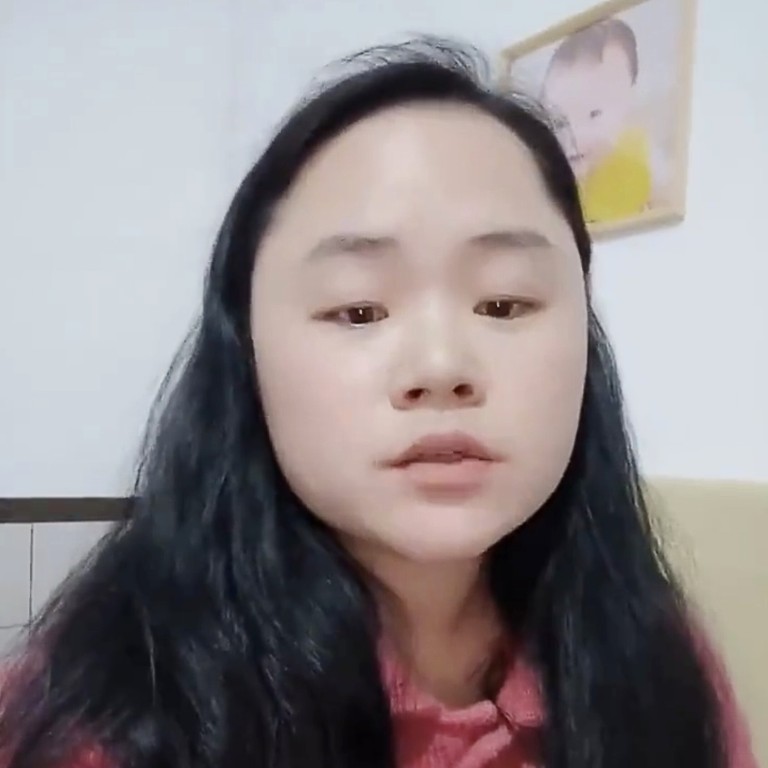
China’s ‘Ink Girl’ who defaced Xi Jinping poster allowed to contact father after protest
- Dong Yaoqiong posted a video on Twitter saying she was ‘on the verge of collapse’ because of restrictions and surveillance
- She has twice been admitted to a psychiatric facility against her will after throwing black ink on an image of the president in 2018, family says
An activist known as “Ink Girl” who defaced a poster of Chinese President Xi Jinping two years ago in Shanghai has been allowed to contact her father after she protested on social media about the intrusive surveillance she is subjected to.
Dong Yaoqiong, 31, posted a video on Twitter on Monday from her home in Hunan province, saying she was “on the verge of collapse” because of the restrictions she has been placed under.
It was the first time the 31-year-old has spoken publicly about her situation since she live-streamed herself throwing black ink on a poster of Xi in July 2018, saying she opposed his “authoritarian dictatorship”.
Dong has twice been admitted to a psychiatric facility against her will since the incident, according to her family. Her parents are separated, and she now lives with her mother.

Her father, Dong Jianbiao, has been prevented by authorities from contacting his daughter because of “social stability” concerns. He has previously asked for this restriction to be lifted, and also sought to raise awareness of her plight.
Speaking by phone, the 53-year-old said he had escaped a mining accident with minor injuries on Sunday, but 13 others remained trapped underground after the privately owned coal mine they were working in collapsed in Leiyang, Hunan province.
He said his daughter had been allowed to call him by phone on Monday night.
Dong Yaoqiong confirmed that she had posted the video on Twitter and said she was “safe for now” but was not allowed to talk to the media.
In the video, she says one of her friends told her about the mine collapse but she had been barred from contacting her father.
A friend who requested anonymity said national security police had visited Dong Yaoqiong on Tuesday and most of her tweets had been deleted by the afternoon.
But her two-minute video had already been widely circulated on social media platforms including Twitter, which is blocked in China.
She says in the video that she was released from the psychiatric facility in the summer and assigned to a clerical job at a county government office.
“I have now decided to speak up on Twitter because I no longer fear them, even if they lock me up again in hospital … even if that means being locked up forever,” Dong says.
She insists in the video that she is not mentally ill, and says she no longer has the freedom to choose her job or friends.
“They don’t threaten or terrorise [me] but they are essentially stripping me of all human contact, including with my father,” she says. “I don’t want to live like this any more. It’s either do or die – I can no longer carry on under such stressful surveillance and I’m on the verge of collapse.”
Prison recommended for Chinese citizen journalist for coronavirus reports from Wuhan
Dong Jianbiao said he had not seen his daughter since February.
“I was placed under surveillance and given verbal warnings by local police every time I tried to contact her,” he said. “My daughter is mentally sound. I admire her for having the courage to speak up and fight for her rights.”
He said Dong Yaoqiong was sent to the psychiatric facility in Zhuzhou, Hunan after she defaced the poster in July 2018, and she had been kept there until the end of 2019. She was admitted for a second time in May this year for about a month, he said.
Hunan-based activist Ou Biaofeng, who has been following Dong’s case, was convinced that she was mentally sound.
“Dong is a classical example of the consequences of public resistance,” Ou said. “She is a rare rebel.”
Leo Lan, a research and advocacy consultant with Chinese Human Rights Defenders, said Dong’s well-being had been a concern since her disappearance after the 2018 protest.
“It’s not uncommon for Chinese dissidents to be admitted to psychiatric facilities against their will, which often results in their political advocacy being discredited as ‘mental problems’,” Lan said.
“This deters the entire Chinese human rights community from speaking up.”

